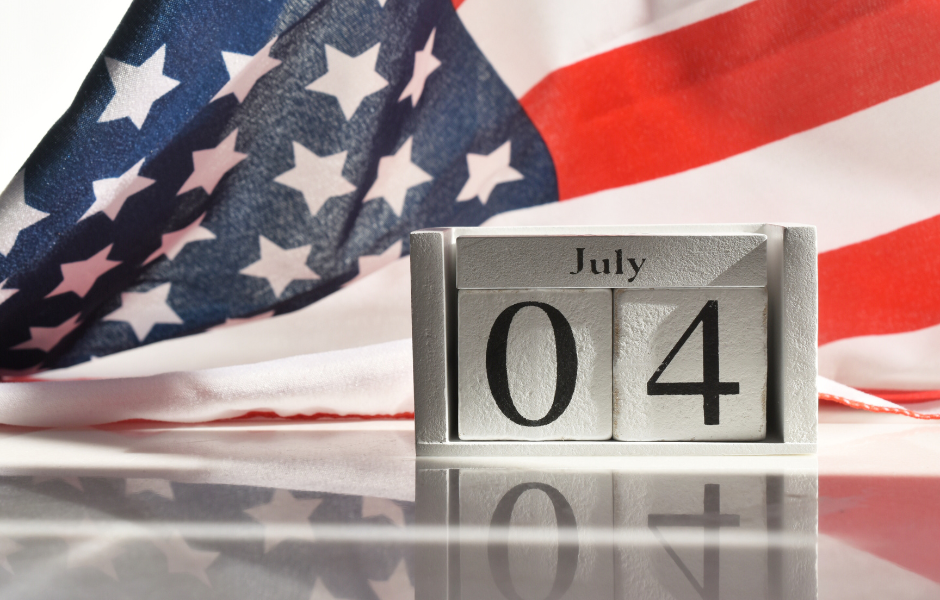With the long Fourth of July weekend fast approaching, we want to share some reminders for making it a safe one.
Every year, there are numerous reported injuries, illnesses and accidents that put a damper on the holiday celebrations. Let’s make 2023 as safe as it can be, by following some simple recommendations for avoiding common July 4th hazards:
TRAVEL
- Do not drive a car or boat under the influence of alcohol or other substances. Nearly half of all crash deaths during this holiday involve alcohol.
- Have a designated driver if you are planning on drinking.
- Put distractions away. Focus on the road.
- Drive defensively and take your time.
- Leave a three-second following distance from the car in front of you at all times.
- Prepare in advance. Know where you are going and how long it should take to get there.
HEAT
- Stay hydrated by drinking plenty of non-caffeinated and non-alcoholic fluids.
- Postpone outdoor activities if temperatures are dangerously high.
- If you don’t have air conditioning, seek relief from the heat in places like libraries, theaters, malls, etc.
- Wear loose-fitting, lightweight, light-colored clothing.
- Slow down and avoid strenuous exercise during the hottest part of the day.
- Check on animals frequently. Make sure they have plenty of cool water and shade.
COOKOUTS
- Don’t leave food out in the hot sun. Keep perishable foods in a cooler with plenty of ice or freezer gel packs.
- Wash your hands before preparing food.
- Always supervise the grill when in use.
- Don’t add charcoal starter fluid when coals have already been ignited.
- Use long-handled tools especially made for cooking on the grill
- Keep the grill out in the open, away from the house, the deck, tree branches, or anything that could catch fire. Never grill in an enclosed space.
- Keep children and animals away from the grill.
FIREWORKS
- Consider attending a public fireworks display rather than setting off your own
- Obey local laws. Fireworks may be illegal in your area.
- Consider your pets. If they are afraid of fireworks make sure they are in a secure setting and can’t run away.
- Only light fireworks outdoors on a smooth, flat surface a good distance away from people and structures.
- Never tamper with or try to customize fireworks.
- Wear eye protection when lighting fireworks.
- Keep fireworks away from small children.
- Do not point fireworks at people, pets, vehicles or structures.
- Have water nearby, just in case.
- Light only one firework at a time and never attempt to relight a firework that has malfunctioned.
- Dispose of all firework materials by soaking them in water before putting them in the trash
BEACH AND POOL SAFETY
- Be vigilant at all times, especially if children who aren’t experienced swimmers are part of your group.
- If you have children who are not competent swimmers, make sure they are fitted with a U.S. Coast Guard-approved life jacket
- Designate an adult to supervise water activities. This can be done in shifts, so everyone can enjoy their time without worry.
- Use sunscreen.
- Watch the weather and get out of the water at the first sign of lightning or the rumble of thunder. Stay indoors for 30 minutes after the last lightning flashes or thunder roars
- If you are at a community pool or the beach, swim where there is a lifeguard in a designated swimming area.
- Follow all lifeguard directions.
- Always swim with a buddy.
- Be sober when you swim.
- Know your limitations and make sure you have enough energy to swim back to shore.
- Protect your neck – don’t dive headfirst.
- If you are caught in a rip current, try not to panic. Signal to those on shore that you need assistance. The Red Cross recommends swimming “parallel to the shore until you are out of the current. Once you are free, swim toward shore. If you can’t swim to the shore, float or tread water until you are free of the rip current and then head toward shore.”
The weekend is a couple of days away, but as you consider Labor Day and other holidays, our number one recommendation is advanced preparation. Take one of our CPR and first aid courses, learn about boating safety, get swimming lessons for your kids, check your car, your grill, your boat, etc. to make sure they are in working order, etc. For more information, about basic safety planning and education, contact us at info@tss-safety.com.

